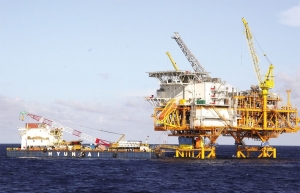Weighing over novel points in insurance sector investment activities
 |
| Nguyen Quang Huyen, deputy general director of the Insurance Supervisory Authority |
The insurance sector has managed constant growth in the past years. How would we best avail of investment channels from the insurance sector?
Even when production and business activities were in the doldrums, the insurance sector still secured double-digit growth.
For instance, during 2020-2021, under the drastic impacts of the COVID-19 pandemic, the insurance sector still managed high growth, from there reinvesting billions of dollars back into the economy.
The insurance sector has been an important investment channel into the economy, yet its investment activities are yet to be diversified as being restricted by the Law on Insurance Business which was enacted in 2000.
Hence, Resolution No.39-NQ-TW dated January 2019 on improving usage, exploitation, and management efficiency spelt the need to encourage insurance businesses to invest back in the economy.
On that basis, the National Assembly greenlit the Law on Insurance Business 2022.
The Ministry of Finance (MoF) is hastily working on the draft Decree guiding the implementation of the new law to be able to bring it to life in 2023.
What are the highlights of the new law?
The Law on Insurance Business 2000 allows insurance firms to use their idle capital for investment purposes, such as buying government bonds, corporate bonds, stock, real estate investment, and offering loans in light of the Law on Credit Institutions.
| Undergoing more than 20 years of development with a growth pace averaging 20 per cent annually, the local insurance market and insurance firms have grown stronger and lured the presence of leading global insurers. |
However, to ensure the investment efficiency of insurers, the Law consists of specific investment portfolios for insurers.
A highlight of the new law is that it removes regulations about investment portfolios for insurers in order to encourage insurance firms to more strongly invest in the economy.
Another breakthrough is that, from 2023, insurance firms can invest abroad in the form of funding or making capital contributions; pooling capital or buying the stock of foreign insurers; purchasing stocks and other valuable papers, or making investment ventures through stock investment funds and other financial intermediaries abroad.
These contents, however, are quite novel, so the government has been assigned to provide concrete guidance, and the MoF is penning a governmental Decree guiding the implementation of several points in the new law, including these contents.
Are there some cautions regarding insurers’ investments in your view?
Formerly, restrictions were important due to the limited financial strength of insurance firms, and the fledging nature of Vietnam’s insurance market compared to other countries.
Undergoing more than 20 years of development with a growth pace averaging 20 per cent annually, the local insurance market and insurance firms have grown stronger and lured the presence of leading global insurers. Issuance of investment portfolios to insurance firms appears unnecessary now.
Hence, from 2023, investment activities of insurance firms would follow the concept of ‘select to remove’ instead of ‘select to allow’ as presently.
Along with this, with their investment, the insurers must follow the principles of ensuring safety, liquidity, efficiency, observing the law, taking accountability for their investment activities, and avoiding risks.
To ensure insurance market security, insurance firms are not allowed to borrow to invest; and commit authorised investment into stock or make capital contributions to other firms.
They also cannot buy corporate bonds to restructure the debts of the firms issuing the bonds or invest in precious metals and gems, in stock derivatives, and futures contracts, except in some cases.
They are also not allowed to invest in real estate trading, except by buying the stock of listed real estate firms, public fund certificates, and several other cases.
Since 2023, insurance firms can invest in all fields except several of those mentioned above.
In addition, to ensure security the MoF envisages submitting to the government detailed regulations about investment limits in particular fields to insurers to mitigate risk.
 | Oil and gas sector counting on vital new investment cycle As oil prices anchor around $90-100 per barrel globally, changes in the oil and gas policy of many markets are expected to bring a new cycle of investment to Vietnam – with the government also taking steps to transition to renewable energy sources by cooperating with countries around the world. |
 | Vietnam’s logistics sector attracts more foreign investment inflows Foreign investors will continue to pour money into Vietnam’s logistics sector to seize post-pandemic development opportunities, Lao Dong newspaper quoted Piyush Rathorenoi, General Director of the Transworld QBV ICD as saying. |
What the stars mean:
★ Poor ★ ★ Promising ★★★ Good ★★★★ Very good ★★★★★ Exceptional
Related Contents
Latest News
More News
- Spring Fair 2026 boosts domestic demand (March 02, 2026 | 16:30)
- Law on Investment takes effect (March 02, 2026 | 16:21)
- Ho Chi Minh City attracts nearly $980 million in FDI in early 2026 (March 02, 2026 | 10:57)
- Businesses bouncing back after turbulent year (February 27, 2026 | 16:42)
- VinaCapital launches Vietnam's first two strategic-beta ETFs (February 26, 2026 | 09:00)
- PM sets five key tasks to accelerate sci-tech development (February 26, 2026 | 08:00)
- PM outlines new tasks for healthcare sector (February 25, 2026 | 16:00)
- Citi report finds global trade transformed by tariffs and AI (February 25, 2026 | 10:49)
- Vietnam sets ambitious dairy growth targets (February 24, 2026 | 18:00)
- Vietnam, New Zealand seek level-up in ties (February 19, 2026 | 18:06)

 Tag:
Tag:


























 Mobile Version
Mobile Version